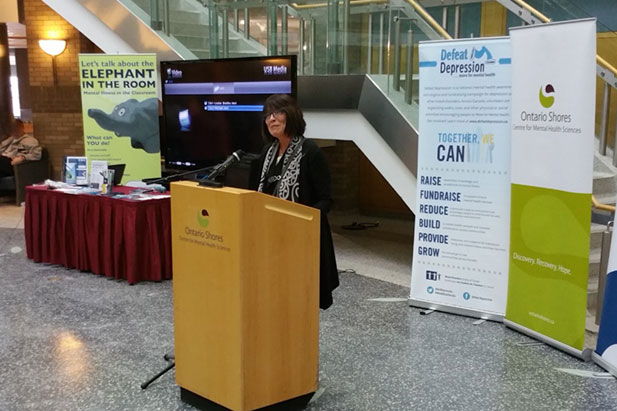New mental-health curriculum prepares nurses to break down barriers for patients
January 27, 2016

According to the Mood Disorders Society of Canada (MDSC) and the Mental Health Commission of Canada (MHCC), one in five Canadians will personally experience a mental illness or problem each year. People living with mental illness are understandably fearful of being judged or discriminated against by friends, family members and co-workers.
But Dr. Victoria Smye, Associate Professor, Faculty of Health Sciences (FHS) and Director of the university’s Nursing program, says people living with mental illness need to experience absolute trust and safety when confiding their situation in a health-care environment.
“Sadly, even health-care providers have been known to stigmatize patients,” said Dr. Smye.
MHCC President and CEO Louise Bradley agreed. “I’ve heard many times stories about people who show up in the emergency room with an injury or heart problem, and as soon as the chart indicates that someone has a history of mental illness, suddenly that physical illness is not taken as seriously.”
The MDSC invited Dr. Smye to help address this issue by developing a national anti-stigma education program for nurses and other health-care professionals who work with people living with mental illness. Through support from the Bell Let’s Talk awareness campaign and the MHCC, she is the primary author of a new online curriculum entitled De-Stigmatizing Practices and Mental Illness: Nurses Working Together to Support Mental Health and Well-Being. The Canadian Nurses Association and the MDSC officially released the curriculum on January 15.
“Stigma, both inside and outside of the health-care system, acts as a tremendous barrier to access to care,” Dr. Smye said. “This curriculum is the first step to helping remove that barrier.”
The curriculum covers topics such as:
- What is stigma, how is it expressed, and what are its consequences?
- What are some of social determinants that intersect with mental health (e.g., poverty, lack of housing, early childhood experiences/trauma, substance use, gender, age, [dis]ability, sexual orientation, religion, geography)?
- What are some strategies for interrupting stigma, dispelling myths and changing the language we use to talk about mental health?
The curriculum incorporates videos, case studies, self-tests, and the opportunity for health-care providers to create a personal plan of action. It includes testimonials from individuals living with mental illness and observations from family members who have experienced stigma first-hand. These accounts also communicate the positive difference a nurse can make to set a patient on the road to recovery.
“Mental health is an issue everywhere in health care – not just in hospitals, but in other community health-care settings where nurses work,” explains Dr. Smye, whose research focus addresses inequity in access to mental health and addictions care. “As one of the largest health-care professional populations, nurses have the opportunity to be real advocates for change; they can have a huge impact in anti-stigma work.”
Dr. Smye has served on the MDSC board for 11 years. As the subject-matter expert on the advisory panel for the project, she consulted with other national experts. The curriculum was also reviewed by a number of nurses and partners such as the MHCC.
Nursing is the second professional group for which an anti-stigma curriculum has been developed. The first version was for physicians. An anti-stigma curriculum for lawyers has also been developed.
Additional resources:
- Mood Disorders Society of Canada (MSDC). Quick Facts: Mental Illness and Addiction in Canada (3rd Ed.); 2005.



